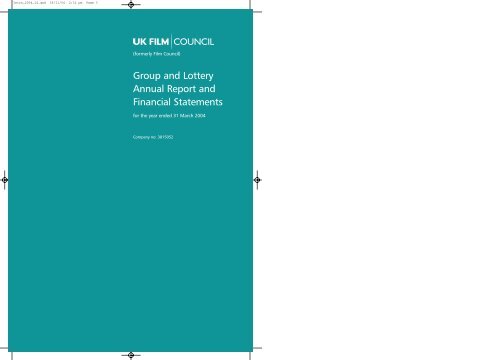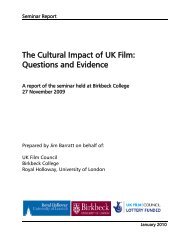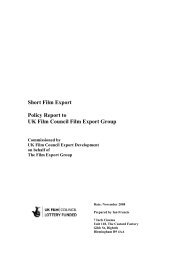04 Part 1 - BFI - British Film Institute
04 Part 1 - BFI - British Film Institute
04 Part 1 - BFI - British Film Institute
Create successful ePaper yourself
Turn your PDF publications into a flip-book with our unique Google optimized e-Paper software.
Intro_20<strong>04</strong>_14.qxd 19/11/<strong>04</strong> 2:32 pm Page 3<br />
(formerly <strong>Film</strong> Council)<br />
Group and Lottery<br />
Annual Report and<br />
Financial Statements<br />
for the year ended 31 March 20<strong>04</strong><br />
Company no: 3815052
Intro_20<strong>04</strong>_14.qxd 19/11/<strong>04</strong> 2:32 pm Page 4<br />
Contents Chairman’s foreword<br />
Chairman’s foreword ................................................................................................................. 5<br />
Chief Executive Officer’s review ................................................................................................ 6<br />
Summary of activity ................................................................................................................... 9<br />
The role of the UK <strong>Film</strong> Council ............................................................................................... 10<br />
Diversity and inclusion .............................................................................................................. 10<br />
Nations and regions .................................................................................................................. 11<br />
Culture and education .............................................................................................................. 11<br />
Skills training ............................................................................................................................ 12<br />
Developing better scripts .......................................................................................................... 13<br />
<strong>Film</strong> production ........................................................................................................................ 13<br />
First Light – young people making movies ................................................................................ 15<br />
Supporting quality, popular films............................................................................................... 15<br />
The production franchises ......................................................................................................... 16<br />
Distribution and exhibition ....................................................................................................... 17<br />
The UK’s position as an international business ‘hub’ ................................................................. 17<br />
The USA .................................................................................................................................... 18<br />
Europe ...................................................................................................................................... 18<br />
<strong>Film</strong> export promotion and international marketing ................................................................. 19<br />
Monitoring and evaluation ..................................................................................................... 20<br />
Operating and financial review .............................................................................................. 21<br />
Employment statistics ............................................................................................................. 24<br />
Group Annual Report and financial statements ..................................................................... 26<br />
Lottery Annual Report and financial statements .................................................................. 70<br />
Statutory background ........................................................................................................... 116<br />
4 GROUP AND LOTTERY ANNUAL REPORT AND FINANCIAL STATEMENTS 2003/<strong>04</strong><br />
Welcome to our fourth annual report of the UK <strong>Film</strong> Council.<br />
The Board of Directors spent a good deal of time during<br />
the year looking forward, formulating our second strategic<br />
plan which sets the compass for our activities over the<br />
next three years. The plan builds on the priorities set<br />
out at our inception, seeking to consolidate what we’ve<br />
already achieved – for example, through continuing direct<br />
support for script development and film production –<br />
while developing the basis for new and expanded policy<br />
interventions. These include policies that address the<br />
increasing problem of film piracy, that help us deliver<br />
on our commitment to cultural diversity and inclusion,<br />
and that will help enhance media literacy among the UK<br />
population as a whole.<br />
The development of strategy is, of course, informed by<br />
an analysis of the current performance of the UK film<br />
industry and the impact of UK film culture. That is one<br />
reason why the statistics produced by our Research and<br />
Statistics Unit are so invaluable.<br />
The statistics are also a crucial tool in enabling those<br />
within the industry and working in film culture and<br />
education to plan and develop their business and<br />
policies. The provision of these statistics is an excellent<br />
example of the way in which the UK <strong>Film</strong> Council is<br />
now delivering significantly enhanced value to its<br />
external stakeholders.<br />
This is the last introduction I shall be writing to this<br />
publication. And by the time it is published, I shall have<br />
retired from the Board after five years as UK <strong>Film</strong> Council<br />
chair. I look back with considerable pride on what we<br />
have achieved in a relatively short space of time and I’m<br />
extremely grateful for the work put in by all my fellow<br />
Board members and by the UK <strong>Film</strong> Council staff – effort<br />
that has paid real dividends.<br />
We have brought structural coherence to the landscape<br />
of policy and public funding for UK film – something<br />
that was clearly absent when we began our work. We<br />
have made targeted and effective interventions in<br />
virtually every part of the film sector from developing<br />
new creative talent through to cinema exhibition. And<br />
we have laid out a clear path for the delivery of public<br />
policy objectives for the UK film industry<br />
and for UK film culture and education over<br />
the next few years.<br />
During the year, we unveiled a new strategy in<br />
partnership with Skillset for developing the film<br />
workforce backed with serious investment; saw<br />
a fundamental review of the <strong>British</strong> <strong>Film</strong> <strong>Institute</strong>;<br />
worked with industry and Government to secure a<br />
new tax mechanism for film; and implemented a radical<br />
support scheme for the distribution of specialised films.<br />
However, a great deal more remains to be done<br />
to maximise the potential of UK film at home and<br />
around the world. As I said in my presentation at BAFTA<br />
in November 2002, the UK <strong>Film</strong> Council exists to serve<br />
our industry and to advise Government. But we can’t be<br />
the industry, or define film culture: the UK <strong>Film</strong> Council<br />
exists only to encourage an environment in which<br />
industry and culture can flourish and thrive.<br />
Over the next four years, therefore, the task of Stewart<br />
Till CBE, the new Chair, and the entire Board will be to<br />
build upon what we’ve already achieved and I wish<br />
them every success. I think it is true to say that whilst<br />
the funding landscape is clearer and more equitable<br />
than ever before, the real prize – closer integration<br />
across the industry, and in particular, stronger lines<br />
between the finance, production and distribution<br />
sectors – is still to be won.<br />
For the moment the ‘cottage industry’ of production still<br />
prevails and until that structure changes there will always<br />
be a need for a UK <strong>Film</strong> Council to stimulate change and<br />
to challenge the industry to raise its game.<br />
___________________________________<br />
Sir Alan Parker CBE<br />
Chairman<br />
30 July 20<strong>04</strong><br />
GROUP AND LOTTERY ANNUAL REPORT AND FINANCIAL STATEMENTS 2003/<strong>04</strong><br />
5
Intro_20<strong>04</strong>_14.qxd 19/11/<strong>04</strong> 2:32 pm Page 6<br />
Chief Executive Officer’s review<br />
As this publication goes to print, we are releasing<br />
our second three–year strategic plan (available at<br />
www.ukfilmcouncil.org.uk) which sets out the<br />
funding and policy priorities for the UK <strong>Film</strong><br />
Council for the next three years (20<strong>04</strong> to 2007).<br />
During our first three years (2000/03), we totally<br />
restructured the way that public funding is invested in<br />
a range of film initiatives, including script development,<br />
film production, and the development of film in the<br />
English regions. That first stage of our work has been<br />
successfully completed so now we move on.<br />
Our funding and policy priorities going forward will<br />
encompass all of the initiatives created in our first three<br />
years. In addition, however, we are adding a new focus<br />
on audiences, skills development, media literacy, diversity<br />
and inclusion, and international partnerships. As usual<br />
we will pursue these priorities in partnership with both<br />
private and public sector stakeholders.<br />
Among our pre-existing activities, I am particularly<br />
pleased with the annual £7.5 million of investment<br />
to support film development in the regions through<br />
the nine English Regional Screen Agencies (RSAs).<br />
These organisations support a wide variety of<br />
initiatives, including cinema exhibition, film education,<br />
film archives and heritage, film production, script<br />
development and locations services. Operating<br />
at a local level, the RSAs work closely with local<br />
communities and businesses. Collectively the<br />
agencies have raised the profile of film within the<br />
English regions and they have also delivered £6.5<br />
million of additional annual investment in the last<br />
year. They are a testament to intelligent regionalism.<br />
2003 was also a record year for film production<br />
for the UK as a whole, with £1.17 billion invested<br />
in the production of 177 films. In truth, much of<br />
the sustained growth in the production sector and<br />
services infrastructure over the past five years has<br />
been catalysed by tax policy, which remains the single<br />
most important lever for driving our industry forward.<br />
In anticipation of the automatic expiry of the Section 48<br />
tax relief in 2005, we have also been working during the<br />
past year with the DCMS, the Treasury and key industry<br />
partners to make the case for a new fiscal incentive to<br />
promote the production of lower budget <strong>British</strong> films<br />
and to complement the ongoing Section 42 incentive<br />
that attracts bigger, mainly US studio-backed, <strong>British</strong><br />
films into the UK. That case was made effectively during<br />
2003 with the result being the announcement of a new<br />
tax credit to support indigenous UK film productions<br />
which will pass into law during 20<strong>04</strong>/05.<br />
The Government has also noted a structural disconnection<br />
between the production and distribution sectors which<br />
continues to inhibit industry growth. Discussions aimed<br />
at improving the effective distribution of <strong>British</strong> films<br />
remain ongoing. In short, the future looks positive despite<br />
the short-term crisis created by the sudden exclusion of<br />
so called ‘tax partnership’ funding for <strong>British</strong> films early<br />
in 20<strong>04</strong>. This made for an extremely difficult year for the<br />
indigenous production sector although, as usual, the<br />
industry looks set to weather the storm.<br />
Over the past three years the UK <strong>Film</strong> Council has also<br />
directly supported a wide range of films with National<br />
Lottery funding through our Development, New Cinema<br />
and Premiere production funds. <strong>Film</strong>s such as Touching<br />
the Void, Bend it Like Beckham, Young Adam, The<br />
Magdalene Sisters, Gosford Park, Bloody Sunday, Sylvia,<br />
Noi the Albino, L’homme du train, and Lottery-funded<br />
franchise films such as 28 Days Later, In this World and<br />
Girl with a Pearl Earring have all attracted critical acclaim<br />
and substantial box office takings around the world.<br />
Our commitment to supporting <strong>British</strong> filmmaking<br />
talent will of course continue through our development<br />
and production funds, and in the coming months <strong>British</strong><br />
talent will be showcased to the world in new UK <strong>Film</strong><br />
Council-backed films such as Mike Leigh’s Vera Drake,<br />
Charles Dance’s Ladies in Lavender, Gary Chapman’s CGI<br />
animated Valiant, John Stephenson’s Five Children and It,<br />
Saul Dibb’s Bullet Boy, Amma Asante’s A Way of Life,<br />
Michael Winterbottom’s Code 46, Michael Radford’s<br />
The Merchant of Venice and Christopher Smith’s Creep,<br />
to name but a few. In order to support the development<br />
of film companies that can nurture films through the<br />
lengthy but essential process of script development,<br />
we also recently announced a new stream of funding<br />
for companies with slates of projects. This will<br />
complement the single project development funding<br />
stream, which will remain in place.<br />
However, supporting film production is only one way<br />
of helping to achieve our objectives, where success<br />
will not be determined solely by investing relatively<br />
small amounts of public money. Three big problems,<br />
which have held back the development of the UK film<br />
industry, were outlined by our Chairman, Sir Alan<br />
Parker CBE, at the end of 2002. Put simply, these<br />
are to improve the effective distribution of UK films,<br />
at home and abroad; to create a favourable operating<br />
environment for the UK film industry (including fiscal<br />
incentives and a more strategic approach to co-production);<br />
and for better training of our workforce. Our efforts on<br />
the new tax incentive, the current co-production policy<br />
review with the DCMS and our new training strategy<br />
are all key to dealing with these issues.<br />
In particular, investing in skills development of the<br />
UK’s film workforce (present and future) is crucial.<br />
Historically, the success of the UK film industry has<br />
been derived from the high quality expertise and<br />
experience of its skills base. Ensuring that the UK film<br />
industry can compete on an international level in all<br />
areas is essential to building our industry. With Skillset<br />
(the Sectors Skills Council for the audiovisual industry)<br />
and all the key industry partners, we developed and<br />
launched a coherent skills strategy in 2003 backed by<br />
a National Lottery investment of £32.5 million over five<br />
years. The implementation of that strategy has now begun.<br />
Separately, we also aim to lead the way in making<br />
interventions across the board to improve diversity<br />
and inclusion, media literacy and film education<br />
and appreciation in the broadest sense.<br />
We are now seeing progress across these particular<br />
areas in a number of ways.<br />
Our detailed plans aimed at improving diversity and<br />
inclusion across the industry were set out in our strategy<br />
Success through Diversity and Inclusion, published in<br />
November 2003, and we are now working with the<br />
industry to help change attitudes and working practices.<br />
Our aim is to deliver an industry workforce that<br />
more accurately reflects the make up of the UK<br />
population and ultimately we aim to ensure that<br />
a more diverse range of <strong>British</strong> films is offered to<br />
audiences across the UK.<br />
Offering opportunities for people to learn more about<br />
film in a variety of ways and environments is also central<br />
to developing film in the UK. Our key strategic partner<br />
in achieving these goals is the <strong>British</strong> <strong>Film</strong> <strong>Institute</strong> (bfi),<br />
which announced in 20<strong>04</strong> the results of a strategic<br />
review, setting out how the organisation will become<br />
more outward-looking and work in partnership with<br />
others in order to promote film appreciation and to<br />
broaden the availability of our television and film<br />
culture and heritage.<br />
Inform and Empower, a key conference tackling the<br />
importance of media literacy, was also held with the<br />
bfi, Channel 4, the BBC and Ofcom early in 20<strong>04</strong>, and<br />
we invited stakeholders in industry, education and<br />
culture to develop the case for promoting the concept<br />
of media literacy and to underline its importance to<br />
all citizens in the UK. A task force has now been<br />
established to move these proposals forward.<br />
Over the next three years, we will also continue to<br />
support the First Light initiative to give young people<br />
across the UK and from all backgrounds the opportunity<br />
to make films, and in so doing to learn about the skills<br />
and processes that underpin the construction of images<br />
and narrative. Since First Light was launched, almost<br />
7,500 young people have now made short films using<br />
digital technology.<br />
Turning specifically to film audience development,<br />
we also set up in the past year a series of radical<br />
new initiatives through our Distribution and<br />
Exhibition Department.<br />
Last year, UK cinema-goers made 167 million visits<br />
to the cinema, yet large areas of the UK, especially<br />
rural locations, still have no convenient access to<br />
cinemas. Through a £500,000 digital fund for nontheatrical<br />
exhibition, operators such as film clubs and<br />
local film societies, community groups and mobile<br />
cinemas can now offer new films to people living in<br />
areas without a local cinema.<br />
Also, as part of our National Lottery-funded Cinema<br />
Access Programme, 78 cinemas (one in seven across<br />
the UK) are being equipped with captioning and audiodescription<br />
equipment to improve facilities for<br />
6 GROUP AND LOTTERY ANNUAL REPORT AND FINANCIAL STATEMENTS 2003/<strong>04</strong> GROUP AND LOTTERY ANNUAL REPORT AND FINANCIAL STATEMENTS 2003/<strong>04</strong><br />
7
Intro_20<strong>04</strong>_14.qxd 19/11/<strong>04</strong> 2:32 pm Page 8<br />
Chief Executive Officer’s review<br />
continued<br />
cinema-goers with impaired hearing and sight. In<br />
addition, a web-based film information service has<br />
also been developed to inform those with sensory<br />
impairments about films being screened at local<br />
cinemas in England.<br />
In July 2003, we also announced plans to invest<br />
£13 million of National Lottery funding (through Arts<br />
Council England) to establish a Digital Screen Network<br />
across the UK. This world-first initiative will maximise<br />
the advance of digital technology to increase the<br />
opportunities for audiences to see specialised and arthouse<br />
films on around 250 digital screens across the UK<br />
(over a quarter of all cinema sites). The implementation<br />
of this strategy is now underway and this support for<br />
high quality and cost-effective digital projection and<br />
distribution aims to offer UK film audiences a broader<br />
selection of films than ever before.<br />
Also, in order to support and stimulate the<br />
specialised distribution and exhibition sector, we<br />
are providing financial support to expand the range<br />
of films on offer to audiences across the UK. <strong>Film</strong>s<br />
including Bad Education (Spain) Good Bye Lenin!<br />
(Germany), Whale Rider (New Zealand), Capturing the<br />
Friedmanns and The Station Agent (US independent),<br />
Zatoichi and Spirited Away (Japan), Swimming Pool<br />
(France), Barbarian Invasions (Canada) and Respiro<br />
(Italy) were made available to many more cinemas<br />
and, therefore, larger audiences during 2003 through<br />
our Lottery Specialised Prints and Advertising Fund.<br />
Our commitment to broadening opportunities for<br />
people to see films also encompasses the important<br />
role that public service broadcasters have to play,<br />
both as financial investors in <strong>British</strong> films and also<br />
as distribution channels for films to reach audiences.<br />
<strong>Film</strong> and television are an essential part of national<br />
cultural identity and, following our representations,<br />
the Communications Act incorporated a clause<br />
specifying that Ofcom should consider the<br />
commitment to film of terrestrial broadcasters<br />
when examining how they meet their public<br />
service obligations. We are now in discussions<br />
with both Ofcom and broadcasters as to how<br />
the new law will work.<br />
8 GROUP AND LOTTERY ANNUAL REPORT AND FINANCIAL STATEMENTS 2003/<strong>04</strong><br />
On a very different note, film theft and piracy also<br />
emerged at the top of our agenda during the last year.<br />
In September 2003 we set up an Anti-Piracy Task Force<br />
comprising senior representatives from across the film<br />
sector. This Task Force has developed a series of practical<br />
recommendations to combat both physical and online<br />
piracy, and these recommendations will be published<br />
later this year.<br />
The Board and staff of the UK <strong>Film</strong> Council know that<br />
the organisation still has a great deal more work to do<br />
on behalf of film in the UK, with the added challenge of<br />
balancing funding priorities in the context of a reduced<br />
income from the National Lottery. But I remain confident<br />
and optimistic that our work will continue to deliver real<br />
benefits for all our stakeholders.<br />
Finally I would like to pay tribute here to the UK <strong>Film</strong><br />
Council’s founding Chairman, Sir Alan Parker CBE, who<br />
after six years of public service stepped down in July<br />
20<strong>04</strong>. Without him there would have been no UK <strong>Film</strong><br />
Council as we know it, and the good start we have made<br />
would simply never have happened. It was a pleasure<br />
and a privilege to work with Alan, first at the bfi, and<br />
then in building the UK <strong>Film</strong> Council into the strong<br />
and useful body it has quickly become. I shall miss his<br />
guidance and his wisdom enormously.<br />
___________________________________<br />
JOHN WOODWARD<br />
Chief Executive Officer<br />
10 September 20<strong>04</strong><br />
Summary of activity<br />
Policy and funding priorities at a glance<br />
Policy priorities Goals<br />
Fiscal support To ensure effective long-term fiscal measures are in place to support the UK film industry<br />
and its culture<br />
International To modernise the UK’s film co-production agreements<br />
To maximise inward investment by assisting the industry to strengthen the infrastructure for film<br />
To devise and implement a film export strategy<br />
To create opportunities for the UK film industry by building and strengthening relationships<br />
with the US industry<br />
To contribute to the development of European audio-visual policy<br />
Anti-piracy To help combat copyright theft and assist the film industry in responding to changing<br />
market realities and consumer needs<br />
<strong>Film</strong> and broadcasting To ensure optimum fit between UK film policy and UK broadcasting policy<br />
Diversity and inclusion To help achieve a more diverse and inclusive workforce and film culture<br />
Education and literacy To develop and implement a joined-up and effective UK-wide media literacy strategy in<br />
which film and the moving image play a prominent part<br />
Digital technology To help equip the film sector to harness the potential benefits of digital technology<br />
Research and Statistics To gather and publish statistics and to devise, carry out and disseminate research that helps<br />
develop a competitive UK film industry and vibrant film culture<br />
Funding priorities Goals Funds/year<br />
<strong>British</strong> <strong>Film</strong> <strong>Institute</strong> To champion moving image culture in all its richness and £16,000,000<br />
diversity, across the UK, for the benefit of as wide an<br />
audience as possible and to create and encourage debate<br />
Distribution and To offer a more diverse range of films to a broader UK £8,000,000<br />
Exhibition Fund audience<br />
Premiere Fund To assist the production of <strong>British</strong> or European feature films £8,000,000<br />
that can attract audiences the world over<br />
Regional Investment To co-ordinate film policy and strategy across England £7,500,000<br />
Fund for England<br />
<strong>Film</strong> Skills Fund To ensure an adequate supply of skilled and talented £6,500,000<br />
professionals<br />
Lottery Franchises To conclude UK <strong>Film</strong> Council cash investment leading to £5,566,666<br />
the creation of three sustainable UK film companies<br />
New Cinema Fund To support creativity, innovation, new talent and ‘cutting £5,000,000<br />
edge’ filmmaking<br />
Development Fund To broaden the range and ambition of projects and talent £4,000,000<br />
being developed<br />
First Light To offer children and young people the opportunity to £1,000,000<br />
participate in filmmaking<br />
Nations To co-ordinate film policy and strategy UK-wide £505,000<br />
Sponsorship To help promote targeted showcase film events £400,000<br />
Publications Fund To improve the quality of discussion, information and £100,000<br />
debate about film<br />
GROUP AND LOTTERY ANNUAL REPORT AND FINANCIAL STATEMENTS 2003/<strong>04</strong><br />
9
Intro_20<strong>04</strong>_14.qxd 19/11/<strong>04</strong> 2:32 pm Page 10<br />
The role of the UK <strong>Film</strong> Council<br />
The UK <strong>Film</strong> Council is the Government’s strategic<br />
agency for film in the UK. Its aim is to stimulate a<br />
competitive, successful and vibrant <strong>British</strong> film industry<br />
and culture, and to promote the widest possible<br />
enjoyment and understanding of cinema throughout<br />
the nations and regions of the UK.<br />
The UK <strong>Film</strong> Council’s Stage Two strategy set out a<br />
challenging vision for a globally competitive UK film<br />
industry, founded on the three guiding principles of<br />
Sir Alan Parker’s November 2002 keynote address,<br />
Building a Sustainable UK <strong>Film</strong> Industry:<br />
● A distribution-led approach for the commercial UK<br />
film industry that stimulates an environment in which<br />
<strong>British</strong> films maximise their potential with audiences<br />
at home and around the world;<br />
● Ensuring that the UK has the best-equipped, most<br />
highly-skilled and flexible film workforce in the world,<br />
in areas ranging from script development, through<br />
to production, post-production, distribution and<br />
exhibition; and,<br />
● Maintaining and enhancing the industry’s<br />
infrastructure to consolidate the UK as a centre of<br />
global film activity.<br />
During the year the UK <strong>Film</strong> Council passed a number of<br />
key Stage Two strategic milestones.<br />
The Tax Strategy Group, operating under the aegis of<br />
the Department for Culture, Media and Sport (DCMS)<br />
and including representatives from the <strong>British</strong> Screen<br />
Advisory Council (BSAC) and the producer trade body<br />
Pact, submitted a robust analysis of the market failure<br />
affecting film and proposals on future fiscal policy<br />
to support UK films to Government. In response, in<br />
the 20<strong>04</strong> Budget, the Government indicated that it<br />
would be introducing a new fiscal mechanism to<br />
support indigenous UK films after the expiry of<br />
Section 48 in 2005. The group is continuing to work<br />
with Government to help develop this mechanism.<br />
Following representations, Government included a<br />
specific reference to film in the 2003 Communications<br />
Act. Consequently, terrestrial broadcasters must now<br />
outline their policy for film as part of their public service<br />
10 GROUP AND LOTTERY ANNUAL REPORT AND FINANCIAL STATEMENTS 2003/<strong>04</strong><br />
obligations and detailed work is now taking place with<br />
both Ofcom and the broadcasters.<br />
Working with other European national film agencies, the<br />
organisation secured the retention of current European<br />
rules for the public funding of cinema.<br />
An anti-piracy task force was established, with<br />
representatives from key film and video industry<br />
bodies under the chairmanship of distributor Nigel<br />
Green, to ensure that Government, industry and public<br />
sector bodies work together to tackle the copyright<br />
infringement affecting the UK film industry. The task<br />
force commissioned a comprehensive study of film<br />
theft in the UK to inform future initiatives in this area.<br />
The work of the Research and Statistics Unit (RSU)<br />
underpins the development and delivery of the UK<br />
<strong>Film</strong> Council’s policies and strategies. During 2003/<strong>04</strong><br />
the RSU initiated a major study examining the economic<br />
impact of the UK’s screen industries (in partnership with<br />
the English Regional Screen Agencies, Regional<br />
Development Agencies, Northern Ireland <strong>Film</strong> and<br />
Television Commission, Pact and the DCMS), and<br />
with the <strong>British</strong> <strong>Film</strong> <strong>Institute</strong> (bfi), began a study<br />
of the social and cultural impact of local cinemas.<br />
In October 2003, the UK <strong>Film</strong> Council consulted<br />
on a three year plan, Three Years On, to gauge<br />
stakeholders’ views on the organisation’s<br />
future funding and policy priorities.<br />
Diversity and inclusion<br />
Diversity is a catalyst for creativity and is key to the<br />
success of the UK film sector, and the UK <strong>Film</strong> Council<br />
is committed to promoting diversity and social inclusion<br />
through all its strategies and funded programmes.<br />
In Success through Diversity and Inclusion (November<br />
2003), the UK <strong>Film</strong> Council set out a strategy with the<br />
key goals of retaining a diverse workforce; ensuring full<br />
and equal access to film for all audiences; and addressing<br />
issues of content and portrayal.<br />
To support the strategy’s development, the UK <strong>Film</strong><br />
Council created a forum to ensure leadership on diversity<br />
in film, including chief executives and senior managers of<br />
key sector organisations, employers and representative<br />
bodies. Through this forum it plans to develop an<br />
equality standard for the industry. The organisation has<br />
also strengthened its funding agreements to ensure that<br />
National and Regional Screen Agencies deliver their own<br />
diversity strategies.<br />
Audience and workforce diversity came under scrutiny<br />
in a number of separate research initiatives in 2003/<strong>04</strong>:<br />
the ethnic and disability characteristics of film audiences<br />
were explored via an ongoing panel survey; and work<br />
began with Skillset on a project measuring the diversity<br />
of the film workforce. Barriers to success faced by black<br />
and ethnic minority-led film and television production<br />
companies were also investigated in a joint project<br />
funded with Pact.<br />
Nations and regions<br />
Embracing the wealth of talent and opportunities across<br />
the UK, and delivering on all its objectives throughout<br />
the nations and regions, are UK <strong>Film</strong> Council priorities.<br />
The three National Screen Agencies, the Northern Ireland<br />
<strong>Film</strong> and Television Commission, Scottish Screen and<br />
Sgrîn Cymru Wales are key partners in that work.<br />
The National Screen Agencies are autonomous<br />
organisations with strong links to the devolved political<br />
and governmental structures in the nations. These links<br />
add greatly to their ability to work effectively with the<br />
UK <strong>Film</strong> Council in key areas such as exhibition, film<br />
heritage, education and the development of skills.<br />
Shared priorities include promoting diversity and<br />
inclusion in relation to film and the moving image<br />
and continuing to develop initiatives to broaden<br />
access for audiences to specialised film.<br />
Across the English regions the UK <strong>Film</strong> Council’s key<br />
partners are the nine Regional Screen Agencies (RSAs).<br />
During 2003/<strong>04</strong> it invested over £7.5 million in the RSAs<br />
via the Regional Investment Fund for England (RIFE).<br />
The RSAs have an overarching role to support all moving<br />
image activity in their regions and to act as local<br />
advocates for film and the moving image. They support<br />
a wide variety of initiatives including cinema exhibition,<br />
film education, film archives and heritage, production,<br />
script development and locations services. They work<br />
closely with communities within their regions to identify<br />
and challenge barriers to participation in the film<br />
industry and culture, and to raise the profile of film<br />
within regional political and governmental agendas.<br />
The RSAs are: EM Media, <strong>Film</strong> London, Northern <strong>Film</strong><br />
and Media, North West Vision, Screen East, Screen<br />
South, Screen West Midlands, Screen Yorkshire and<br />
South West Screen. The RSAs work together through<br />
Screen England, a joint initiative which offers the<br />
agencies a common voice and a united presence to<br />
promote the English regions to the global film industry.<br />
Many RSAs have sourced additional large production<br />
and development funds with investment primarily from<br />
Regional Development Agencies and Europe. In total, in<br />
2003/<strong>04</strong> the RSAs used UK <strong>Film</strong> Council investment to<br />
leverage just under £7.5 million of additional investment.<br />
Culture and education<br />
The <strong>British</strong> <strong>Film</strong> <strong>Institute</strong> (bfi) is the UK <strong>Film</strong> Council’s key<br />
UK-wide partner in developing UK film culture, heritage<br />
and education.<br />
The bfi’s two main aims are to improve the quality and<br />
status of film education, both formal and informal, in the<br />
UK and to increase and broaden access to the collections<br />
of moving image material which the <strong>Institute</strong> preserves<br />
and holds for the nation.<br />
Following the April 2003 National Audit Office report<br />
(Improving access to, and education about, the moving<br />
image through the <strong>British</strong> <strong>Film</strong> <strong>Institute</strong>), the UK <strong>Film</strong><br />
Council and the DCMS supported bfi chair, Anthony<br />
Minghella CBE, in his fundamental review of the institute.<br />
Following the review, the bfi announced a series of<br />
initiatives to create a more outward-facing, accessfocused<br />
and partnership driven organisation, including:<br />
● Radically re-orientating the National <strong>Film</strong> and<br />
Television Archive with a new emphasis on curating<br />
and interpreting the bfi’s collections to increase<br />
access through distribution;<br />
GROUP AND LOTTERY ANNUAL REPORT AND FINANCIAL STATEMENTS 2003/<strong>04</strong><br />
11
Intro_20<strong>04</strong>_14.qxd 19/11/<strong>04</strong> 2:32 pm Page 12<br />
The role of the UK <strong>Film</strong> Council<br />
continued<br />
● Creating a network of archive portals (or mediatheques)<br />
across the UK where people will be able to view on<br />
demand otherwise unavailable classic film and<br />
television from the national and regional archives;<br />
● Creating ‘virtual bfi’ featuring educational resources,<br />
a web presence for young adults, web casting of bfi<br />
events, and opportunities for creative experimentation<br />
in the moving image;<br />
● Creating a partnership office to be a single point of<br />
contact for colleagues in the nations and regions and<br />
an advocate for a sustainable and vibrant moving<br />
image sector across the UK;<br />
● Focusing on young adults, with a dedicated office to<br />
bring the perspective of young audiences to the heart<br />
of the bfi;<br />
● Support for the creation of a flagship centre for film<br />
and the moving image, and development of a ‘test<br />
bed’ film centre on the South Bank, to include the<br />
National <strong>Film</strong> Theatre, exhibition and information<br />
zones, education facilities, an archive portal and<br />
improved public spaces.<br />
The UK <strong>Film</strong> Council is particularly concerned with the<br />
learning needs of younger audiences. In association<br />
with the bfi it supports the work of <strong>Film</strong> Education,<br />
which promotes the study of film within schools, as<br />
well as the First Light young filmmakers initiative (see<br />
page 15).<br />
The UK <strong>Film</strong> Council is developing a new education and<br />
literacy strategy in association with the bfi, DCMS, the<br />
Department for Education and Skills (DfES), First Light,<br />
<strong>Film</strong> Education and National and Regional Screen<br />
Agencies. The strategy’s key aim will be achieving a<br />
more purposeful relationship between DfES-supported<br />
education and the huge resource that those working<br />
outside formal education can offer learners.<br />
Skills training<br />
Historically the UK film industry’s success has derived<br />
mainly from high quality workforce expertise, and so<br />
developing the UK’s present and future film workforce<br />
is a key priority for the UK <strong>Film</strong> Council.<br />
In its first three years the UK <strong>Film</strong> Council’s Training<br />
Fund worked through more than 50 third-party<br />
organisations to deliver over 2,000 training places. It<br />
12 GROUP AND LOTTERY ANNUAL REPORT AND FINANCIAL STATEMENTS 2003/<strong>04</strong><br />
sought to prioritise the film industry’s script writing and<br />
development capacity by supporting training for script<br />
writers, script editors and development executives. The<br />
fund also enhanced the industry’s professional and<br />
business skills through support for producers, business<br />
executives and distributors.<br />
<strong>Part</strong>nership funding leveraged from a variety of public<br />
and private sources doubled the value of the UK <strong>Film</strong><br />
Council’s investment.<br />
In 2003/<strong>04</strong> these first three-year commitments entered<br />
their final full year of implementation. New activity was<br />
focused on working with Skillset (the Sector Skills Council<br />
for the audiovisual industry) and key industry partners to<br />
develop an industry-wide training and education strategy.<br />
The ground-breaking, five-year UK film skills strategy<br />
A Bigger Future, launched in September 2003, is backed<br />
by £50 million in funding, (£32.5 million of it from the<br />
UK <strong>Film</strong> Council’s National Lottery funding). The first<br />
priorities for the strategy are:<br />
● Skillset Screen Academies: a network of centres of<br />
excellence in film in further and higher education<br />
institutions to provide quality, vocational skills-based<br />
training, linked to industry needs;<br />
● Skillset <strong>Film</strong> Business Academy: focusing on<br />
management and business skills in distribution,<br />
exhibition and facilities;<br />
● Skillset Guiding Lights: 50 big name industry<br />
professionals mentoring 30 writers, directors,<br />
producers, and actors; and 20 agents, distributors,<br />
sales agents, exhibitors, and business affairs new<br />
entrants each year;<br />
● £1 million New Entrants Schemes in year one: to<br />
support a raft of structured new entry schemes<br />
in junior construction, technical, production and<br />
production accounting grades;<br />
● Skillset <strong>Film</strong> Skills Trainee Network: 10 runner-level<br />
and 15 trainee-level new entrants will be talent<br />
spotted to benefit from support, advice, workshops,<br />
introductions to contacts and work experience<br />
placements;<br />
● Accreditation of individual courses: a pilot in higher<br />
education screenwriting courses will launch in 20<strong>04</strong>;<br />
● £700,000 for short courses in year one: to aid the<br />
continual professional development of the existing<br />
workforce; short courses in priority areas will be<br />
discounted and a bursary scheme will be made<br />
available for up to 500 individual practitioners;<br />
● Skillset Training Consultants: advisors will be made<br />
available to small film businesses to help them<br />
organise in-house skills development;<br />
● Skillset Training Management Grants: a select<br />
number of grants to employ in-house training<br />
managers will be available for larger companies<br />
in facilities, post-production, distribution and<br />
exhibition; and,<br />
● Careers Information and Guidance: five film<br />
practitioners will be recruited and trained as<br />
careers advisors to offer face-to-face advice<br />
and guidance sessions.<br />
Developing better scripts<br />
The Development Fund exists to broaden the range,<br />
ambition and diversity of UK film projects and talent.<br />
Specifically, it aims to improve the quality of <strong>British</strong><br />
scripts available to the UK and international industry<br />
through targeted script development initiatives. The<br />
fund spreads its investment across three areas: single<br />
projects; on-going slate funding deals with production<br />
companies; and relevant training programmes.<br />
In 2003/<strong>04</strong> the fund received 1,053 individual<br />
submissions, offers of funding have been taken up by<br />
123 single projects and a further 118 projects received<br />
support through slate funding.<br />
To date 13 projects with Development Fund investment<br />
have been produced or were put into production<br />
including: Danny Boyle’s Millions; Dominic Savage’s Love<br />
and Hate; Emily Young’s Kiss of Life; Peter Richardson’s<br />
Finest Hour (aka Churchill – The Hollywood Years); and<br />
Amma Asante’s A Way of Life.<br />
The Development Fund continues to work across the<br />
breadth of talent within the UK and Europe, from firsttimers<br />
to established filmmakers. Projects currently in<br />
development include documentary filmmaker Dan Reed’s<br />
Straightheads (co-developed with <strong>Film</strong>Four); BAFTAwinning<br />
short filmmaker Tinge Krishnan’s Little Sisters<br />
(co-developed with WT2); You Are Here, Patrice Leconte’s<br />
English-language remake of Monsieur Hire; Perrier’s<br />
Bounty, the second feature from John Crowley (Intermission)<br />
and Dan Leno and The Limehouse Golem, from Terry<br />
Gilliam and Tony Grisoni.<br />
In 2003/<strong>04</strong> the fund continued its support for production<br />
companies through 20 slate deals. Set up for a three-year<br />
period, slate funding deals are tailor-made to support<br />
investment into overhead, business affairs and development<br />
expertise and script development. They are intended<br />
to help companies maintain a more regular flow of<br />
projects in order to increase their attractiveness to<br />
private sector financiers.<br />
The fund will be announcing new slate funding measures<br />
in 20<strong>04</strong>.<br />
The Development Fund has partnered with the nine RSAs<br />
to provide training support and development funding<br />
for up to 100 new writers from across England, and has<br />
hosted a range of networking opportunities for talent<br />
to broker relations between emerging writers, directors<br />
and producers. To date 80 newcomers to the industry<br />
have benefited from this method of forging new<br />
talent relations.<br />
In addition, the fund also supports and develops<br />
programmes aimed at raising the UK industry’s<br />
script-related capabilities. It also partners with the UK<br />
<strong>Film</strong> Council’s other funds to support the Berlinale<br />
Talent Campus (see page 14).<br />
Working with the UK <strong>Film</strong> Council’s International<br />
Department, the Development Fund created a series<br />
of development workshops and seminars aimed<br />
at forging closer links between the UK and Indian<br />
film industries. The series, the first in a range of<br />
collaborations, was run in Mumbai in January 20<strong>04</strong><br />
with the participation of over 100 writers, directors<br />
and producers from the Indian film industry.<br />
<strong>Film</strong> production<br />
The New Cinema Fund (NCF) exists to challenge and<br />
support emerging and established filmmakers to redefine<br />
creative excellence, develop film culture and explore the<br />
possibilities of new production techniques and formats.<br />
GROUP AND LOTTERY ANNUAL REPORT AND FINANCIAL STATEMENTS 2003/<strong>04</strong><br />
13
Intro_20<strong>04</strong>_14.qxd 19/11/<strong>04</strong> 2:32 pm Page 14<br />
The role of the UK <strong>Film</strong> Council<br />
continued<br />
It is committed to encouraging the work of filmmakers<br />
who have been traditionally under-represented in the<br />
industry, particularly those from the UK’s minority ethnic<br />
communities and the nations and regions.<br />
To date the NCF has received 1,270 applications for feature<br />
film funding and has made awards to 30 feature projects,<br />
21 of which have been completed. In addition, the fund<br />
has supported the productionof over 300 short films.<br />
<strong>Film</strong>s and filmmakers supported by the NCF garnered<br />
considerable critical acclaim during 2003/<strong>04</strong>, enjoying<br />
success with both UK and international audiences.<br />
Kevin Macdonald’s Touching the Void became the most<br />
successful <strong>British</strong> documentary ever released in the UK,<br />
grossing over £2.5 million at the box office, and was<br />
voted best film at the 2003 Evening Standard <strong>British</strong><br />
<strong>Film</strong> Awards and <strong>British</strong> <strong>Film</strong> of the Year at the 20<strong>04</strong><br />
BAFTAs. Crowley’s Intermission generated a UK box<br />
office of over £1.9 million.<br />
Feature productions backed by the fund in the past year<br />
include: Chris Cooke’s low budget digital debut feature<br />
One For The Road, theatre director John Furse’s Blind<br />
Flight; The Brothers Quay’s The Piano Tuner of Earthquakes;<br />
Michael Caton Jones’s Shooting Dogs; John Hay’s The<br />
Truth About Love, Brad McGann’s debut In My Father’s<br />
Den; Sarah Gavron’s This Little Life; and Sally Potter’s Yes.<br />
The fund also invested in two French-language coproductions<br />
shooting in 2003/<strong>04</strong> – Lucile Hadzihalilovic’s<br />
Innocence and Ziad Doueiri’s Lila dit ça (Lila Says).<br />
The NCF participates in regular international exchanges<br />
such as the Independent Features Project No Borders market<br />
in New York and Cinemart at the Rotterdam <strong>Film</strong> Festival,<br />
supporting attendance by selected new UK producers.<br />
The UK <strong>Film</strong> Council’s development, production and<br />
training funds support the Berlinale Talent Campus, a<br />
five-day programme held during the Berlin <strong>Film</strong> Festival.<br />
The Talent Campus provides an opportunity for emerging<br />
filmmakers to learn about filmmaking from some of the<br />
world’s most successful practitioners.<br />
In 20<strong>04</strong> it welcomed 510 filmmakers from 84 countries.<br />
14 GROUP AND LOTTERY ANNUAL REPORT AND FINANCIAL STATEMENTS 2003/<strong>04</strong><br />
<strong>Film</strong>makers’ training is integral to the work of the<br />
NCF. Writer, producer and actress Amma Asante, who<br />
made her directorial debut with A Way of Life, was able<br />
to undertake a training course tailored to her specific<br />
needs at the National <strong>Film</strong> and Television School. Hers<br />
was one of the projects to benefit from the fund’s pilot<br />
scheme which enables filmmakers to shoot a few key<br />
scenes to test the latest technology or rehearse new<br />
techniques prior to production. To date, the fund has<br />
supported the production of 18 pilots.<br />
A key new partnership in 2003/<strong>04</strong> with the BBC and<br />
the National <strong>Film</strong> Board of Canada created the £1.5<br />
million World Documentary Fund, which aims to<br />
finance between four to six feature-length theatrical<br />
documentaries over a period of two years. The fund’s<br />
first release, Vikram Jayanti’s Game Over: Kasparov<br />
and the Machine, premiered in the UK at the Sheffield<br />
International Documentary Festival in October 2003.<br />
The NCF also supported Stephen Silver’s Diameter of<br />
the Bomb.<br />
The NCF’s partnership with BBC <strong>Film</strong>s and BBC Two,<br />
which enables artists from different disciplines to cross<br />
over into films, supported Sarah Gavron’s This Little Life<br />
and Saul Dibb’s Bullet Boy.<br />
The NCF also supported the production and release of<br />
a digitally shot thriller, Bille Eltringham’s This is Not a<br />
Love Song. The film’s release combined the first-ever<br />
premiere via the Internet, with selected cinema<br />
screenings across the UK. The host site received<br />
more than 175,000 hits during the week the film was<br />
available. The premiere allowed for universal access,<br />
with the audio-described and subtitled versions of<br />
the film constituting 18% of all downloads.<br />
The NCF’s Digital Shorts Scheme, run in partnership<br />
with the National and Regional Screen Agencies, provides<br />
emerging filmmakers with the opportunity to explore the<br />
creative potential of new technology. The scheme<br />
produces over 100 films per year, and each region has<br />
designed a training programme specifically tailored to<br />
the needs of its filmmakers. Since its launch, the scheme<br />
has provided training opportunities for over 1,900 new<br />
filmmakers. In 2003/<strong>04</strong> the NCF added London-based<br />
production and distribution agency B3 Media to the<br />
scheme’s network of partners to support first-time and<br />
emerging filmmakers from visible ethnic minority groups.<br />
In addition to its digital scheme, the fund runs a small<br />
number of other short film programmes to support and<br />
develop emerging filmmaking talent including Cinema<br />
Extreme and the Completion Fund, both co-funded<br />
with <strong>Film</strong>Four.<br />
First Light – young people making movies<br />
The UK <strong>Film</strong> Council’s most ambitious short film scheme<br />
is First Light, an annual £1 million training and education<br />
project that helps children and young people to make<br />
short digital films.<br />
Managed by Birmingham-based Hi8us First Light Ltd,<br />
the scheme provides opportunities for young people<br />
to experience writing, acting, directing, lighting, editing<br />
and exhibiting films with the guidance of professional<br />
filmmakers in association with youth agencies, schools,<br />
colleges, production companies and film clubs throughout<br />
the UK. To date, First Light has enabled almost 7,500<br />
young people from across the UK to make almost 500 short<br />
digital films, 140 of which were produced during 2003/<strong>04</strong>.<br />
Recent projects include: Seeking (The Living Archive,<br />
Milton Keynes), a documentary exploring the public<br />
perception of asylum seekers and refugees made by<br />
six filmmakers aged 16 to 18 with English as a second<br />
language; and Gearhead (Knowle West Media Centre<br />
and Picture This, Bristol), made by four young people<br />
aged 14 to 16, which depicts the bleak day-to-day<br />
cycle of crime of a young addict.<br />
First Light has also completed a number of other<br />
initiatives. In partnership with the Department for<br />
Education and Skills and Barclays Bank, First Light<br />
has produced a <strong>Film</strong> and Citizenship Screenwriting Kit<br />
and a competition for schools as part of the citizenship<br />
curriculum. First Writes, a screenwriting competition for<br />
11 to 16-year-olds run in collaboration with Scottish<br />
Screen, offered the opportunity for successful scripts to<br />
be made into films.<br />
As well as encouraging young people to learn about<br />
the moving image and explore the creative skills and<br />
processes involved in filmmaking, the scheme encourages<br />
them to consider film as a source of employment. Young<br />
people from ethnic minority groups, with disabilities and<br />
from disadvantaged social backgrounds are key candidates<br />
for participation in the First Light scheme.<br />
After its successful three-year pilot phase, which ends<br />
with 2003/<strong>04</strong>, the UK <strong>Film</strong> Council has made the scheme<br />
a core part of its strategy for 20<strong>04</strong> to 2007. Over the<br />
next three years First Light will seek to secure third party<br />
financing and partnerships to increase the pattern of<br />
schemes and activities available to young people and<br />
groups which work with them.<br />
Supporting quality, popular films<br />
The Premiere Fund aims to harness the vision and<br />
entrepreneurial spirit traditionally associated with the<br />
private sector of the film industry and take a proactive<br />
lead in financing <strong>British</strong> films and UK co-productions<br />
clearly aimed at popular, mainstream audiences.<br />
In 2003/<strong>04</strong>, the fund invested over £8 million in film<br />
projects across a wide range of genres and from both<br />
first-time and established directors. Productions backed<br />
by the fund include: Mike Leigh’s Vera Drake; John<br />
Stephenson’s Five Children and It; Fernando Meirelles’s<br />
adaptation of John le Carré’s The Constant Gardener;<br />
Ealing Studios’ CGI animated feature Valiant; Michael<br />
Radford’s The Merchant of Venice; and Charles Dance’s<br />
debut as a writer/director, Ladies in Lavender.<br />
The Premiere Fund also helps UK filmmakers build<br />
international creative and business relationships through<br />
investing in commercial European co-productions. After<br />
successful screenings at the Venice, Toronto and London<br />
film festivals, the first foreign-language film backed by<br />
the fund, Patrice Leconte’s L’homme du train, was<br />
released in the UK in April 2003. Non-English-language<br />
investments in 2003/<strong>04</strong> include the Spanish-language<br />
Seres Queridos (Only Human), co-produced by the UK’s<br />
Greenpoint <strong>Film</strong>s and Spain’s Tornasol <strong>Film</strong>s.<br />
In addition to investing in high-profile projects aimed at<br />
an international audience, the fund remains committed<br />
to broadening the range of films on offer to domestic<br />
audiences. In 2003/<strong>04</strong>, it invested in two lower budget<br />
films from first-time directors aimed primarily at a UK<br />
audience: Creep, a genre horror film by Christopher<br />
GROUP AND LOTTERY ANNUAL REPORT AND FINANCIAL STATEMENTS 2003/<strong>04</strong><br />
15
Intro_20<strong>04</strong>_14.qxd 19/11/<strong>04</strong> 2:32 pm Page 16<br />
The role of the UK <strong>Film</strong> Council<br />
continued<br />
Smith, starring Franka Potente; and Andy Humphries’s<br />
Sex Lives of the Potato Men, starring Johnny Vegas<br />
and Mackenzie Crook.<br />
The fund also furthers the UK <strong>Film</strong> Council’s overall<br />
training objectives and requires the films it backs to<br />
guarantee training places and to contribute to the<br />
industry’s Skills Investment Fund. The fund supports<br />
such events as BECTU’s Move on Up, the Berlinale Talent<br />
Campus (see page 14), Ateliers du cinéma européen<br />
(ACE), and other training initiatives.<br />
The Premiere Fund is developing a strategy for<br />
diversity and inclusion and requires that all films in<br />
which it invests are delivered in a form accessible to<br />
those with sensory impairments. It has instituted an<br />
intern programme for applicants from minority ethnic<br />
groups to help to address the under-representation<br />
which clearly exists in this area of the industry.<br />
The production franchises<br />
2003/<strong>04</strong> marked the final full year of the six-year term<br />
of the three Lottery-funded film production franchises<br />
set up by Arts Council England – The <strong>Film</strong> Consortium,<br />
Pathé Pictures and DNA <strong>Film</strong>s.<br />
Since their formation the franchises have represented<br />
a key source of production finance for the UK industry,<br />
gearing up Lottery investment with private sector finance<br />
at a favourable ratio of 3:1. Over that time they have<br />
notched up some notable critical and commercial<br />
successes such as In this World (The <strong>Film</strong> Consortium),<br />
Girl with a Pearl Earring (Pathé Pictures) and 28 Days<br />
Later (DNA <strong>Film</strong>s).<br />
Early in 2003 the UK <strong>Film</strong> Council agreed plans to<br />
extend the franchise contracts for The <strong>Film</strong> Consortium<br />
and Pathé Pictures up to March/April 20<strong>04</strong>, in order to<br />
enable the two companies to complete their current slates<br />
of projects. Pathé has publicly committed to continuing<br />
the production of quality, commercial <strong>British</strong> films beyond<br />
the terms of the franchise and The <strong>Film</strong> Consortium has<br />
undergone a corporate restructuring which will carry the<br />
company forward from March 20<strong>04</strong> when the UK<br />
<strong>Film</strong> Council’s Lottery funding commitments end.<br />
16 GROUP AND LOTTERY ANNUAL REPORT AND FINANCIAL STATEMENTS 2003/<strong>04</strong><br />
In 2003/<strong>04</strong> the UK <strong>Film</strong> Council also opened negotiations<br />
which were to lead to the creation of a new joint venture<br />
between DNA <strong>Film</strong>s and US film company Fox Searchlight<br />
Pictures, to produce and distribute <strong>British</strong> films worldwide<br />
into 20<strong>04</strong> and beyond. This new venture would bring<br />
$25 million of US investment to match DNA’s remaining<br />
Lottery funding, and provides access to a successful<br />
worldwide distribution network for UK filmmakers. The<br />
new venture would be achieved without any additional<br />
Lottery investment being made available beyond the<br />
original 1997 Arts Council funding allocation to DNA <strong>Film</strong>s.<br />
In 2003/<strong>04</strong> Pathé Pictures released Girl with a Pearl<br />
Earring by first-time feature director Peter Webber,<br />
which was subsequently nominated for 10 BAFTAs<br />
and three Oscars®. Production was completed on<br />
five other new films: Bride and Prejudice; Roger Michell’s<br />
Ian McEwan adaptation Enduring Love; Danny Boyle’s<br />
comedy Millions; Peter Richardson’s comedy Finest Hour<br />
(aka Churchill – The Hollywood Years); and Shona<br />
Auerbach’s drama Dear Frankie. In addition, the<br />
company entered its third and final year of production<br />
on the CGI animated feature The Magic Roundabout<br />
which features the voices of Robbie Williams, Kylie<br />
Minogue and Joanna Lumley.<br />
Releases from The <strong>Film</strong> Consortium in 2003/<strong>04</strong> were<br />
Stephen Fry’s Bright Young Things, and a 3D IMAX<br />
nature feature, Bugs!, narrated by Dame Judi Dench.<br />
Its previous release, Michael Winterbottom’s Afghan<br />
refugee story In this World (winner of the Golden Bear,<br />
Berlin <strong>Film</strong> Festival 2003) continued its award success,<br />
winning the <strong>British</strong> Independent <strong>Film</strong> Award in 2003 and<br />
the BAFTA for best foreign-language production in 20<strong>04</strong>.<br />
New productions include: John Boorman’s South African<br />
drama Country of My Skull starring Samuel L Jackson<br />
and Juliette Binoche; Pawel Pawlikowski’s romantic<br />
coming-of-age drama My Summer of Love; Saul<br />
Metzstein’s comedy Guy X; and Vincent Ward’s New<br />
Zealand epic River Queen. The <strong>Film</strong> Consortium’s sales<br />
arm, The Works, also handled titles including Michael<br />
Winterbottom’s Code 46 and Niki Caro’s Whale Rider<br />
which went on to gross over $40 million worldwide.<br />
In 2003/<strong>04</strong> DNA <strong>Film</strong>s went into production on the<br />
first feature to shoot under its new venture with Fox<br />
Searchlight, A Way through the Woods, written and<br />
directed by Julian Fellowes and starring Emily Watson,<br />
Tom Wilkinson and Rupert Everett.<br />
Distribution and exhibition<br />
Mainstream, US studio-distributed films account for the<br />
majority share of UK cinema admissions. Specialised<br />
distribution and exhibition sector is a small, fragile and<br />
risky business sector which struggles to grab visibility for<br />
its product.<br />
Consequently, the UK’s diverse cultural mix is not<br />
properly reflected in the range of films available on<br />
screen and large areas of the country, especially very rural<br />
locations, have little if any convenient access to a cinema.<br />
The UK <strong>Film</strong> Council’s key aims within distribution and<br />
exhibition are to:<br />
● Ensure that a broader and more diverse range of<br />
films is available for audiences to view across the UK;<br />
● Develop audience appreciation, enjoyment and<br />
understanding of film;<br />
● Increase audience uptake of specialised films and<br />
thereby help increase levels of cinema-going in the UK;<br />
● Provide greater opportunities for disabled people<br />
(particularly audiences with sensory impairments)<br />
to access and enjoy cinema; and<br />
● Encourage exhibitors, distributors and broadcasters<br />
to engage more fully with a diversity of audiences and<br />
to value the longer term goals of audience development.<br />
These objectives are delivered by the Distribution and<br />
Exhibition Department through a range of initiatives<br />
developed in consultation with the industry, supported<br />
by £3 million a year of UK <strong>Film</strong> Council investment and<br />
£15 million of Arts Council England capital funding.<br />
The Digital Screen Network (DSN) is the cornerstone<br />
of the UK <strong>Film</strong> Council’s strategy to bring a broader<br />
range of films to a wider range of UK cinemas.<br />
The initiative aims to increase the opportunities for<br />
audiences to see specialised and ‘art-house’ films<br />
by equipping up to 250 screens in 150 existing<br />
cinema sites across the UK with the latest digital<br />
cinema equipment.<br />
Launched in 2003, the Specialised P&A Fund<br />
supplements distributors’ own investment in release<br />
and marketing costs for specialised films. It aims to<br />
encourage wider releases and enhanced promotion<br />
in an effort to reach audiences which might not be<br />
aware of, or have the opportunity to view these films.<br />
The fund has backed the release of 15 films that<br />
collectively have realised around £12 million at the<br />
UK box office. The supported films have included Bad<br />
Education (Spain), Good Bye Lenin! (Germany) and<br />
Whale Rider (New Zealand).<br />
The department also supports the UK <strong>Film</strong> Distribution<br />
Programme which encourages the wider release of<br />
new <strong>British</strong> films with significant commercial appeal<br />
by underwriting any shortfall between rental incomes<br />
received and final release costs. The first film released<br />
under the scheme was Stephen Fry’s directorial debut<br />
Bright Young Things (September 2003) which generated<br />
£1.1 million at the UK box office.<br />
In 2003/<strong>04</strong>, 78 cinemas in England were awarded<br />
grants through the Cinema Access Programme (CAP)<br />
to purchase new digital equipment that would increase<br />
access for those with auditory or visual impairments.<br />
The programme also helps distributors fund the<br />
production of subtitle/audio description CD-ROMs for<br />
smaller, independently produced films released on less<br />
than 100 prints and has supported the development<br />
of a web-based information service –<br />
www.yourlocalcinema.com – that informs those with<br />
sensory impairments about the availability of subtitled<br />
and audio described films.<br />
The department also supports film exhibition activity<br />
outside the traditional cinema model through its Digital<br />
Fund for non-theatrical exhibition, helping to underwrite<br />
the costs of new digital technology for film clubs and<br />
local film societies, community groups and mobile<br />
cinemas, all of which extend the range and diversity<br />
of cinema-going opportunities.<br />
The UK’s position as an international business ‘hub’<br />
The future commercial success of the UK film industry<br />
will depend increasingly on its ability to position itself<br />
as a leading filmmaking centre within the global<br />
production industry. It is a key UK <strong>Film</strong> Council priority<br />
GROUP AND LOTTERY ANNUAL REPORT AND FINANCIAL STATEMENTS 2003/<strong>04</strong><br />
17
Intro_20<strong>04</strong>_14.qxd 19/11/<strong>04</strong> 2:32 pm Page 18<br />
The role of the UK <strong>Film</strong> Council<br />
continued<br />
to ensure the development of the UK as a European<br />
hub for international film business, a natural destination<br />
for international investment and a first-choice supplier<br />
of skills and services to the global market.<br />
The UK <strong>Film</strong> Council has placed an increasing emphasis<br />
on the UK’s relationship with film industries and creative<br />
communities throughout the world. To provide a single,<br />
recognisable UK film agency identity, in May 2003 the<br />
organisation added UK to its previous <strong>Film</strong> Council<br />
designation, and renamed its inward investment arm,<br />
(formerly the <strong>British</strong> <strong>Film</strong> Commission), UK <strong>Film</strong> Council<br />
International, which took on a wider international brief<br />
including export promotion.<br />
The massive growth in co-productions between the UK<br />
and other countries shows clearly that UK producers are<br />
partnering with their overseas colleagues to a degree<br />
never seen before. There have been specific problems,<br />
however, within the co-production framework under<br />
which many of these partnerships take place.<br />
In the past year, the UK <strong>Film</strong> Council’s International<br />
Department has been working with the DCMS to<br />
tackle these issues, and to develop clear proposals<br />
for the future application of film treaties. In November<br />
2003, <strong>Film</strong>s Minister Estelle Morris announced a<br />
root-and-branch review of the UK’s international<br />
film co-production treaties, to be carried out jointly<br />
by the DCMS and the UK <strong>Film</strong> Council.<br />
In November 2003 the department published a<br />
report, Post-production in the UK, which outlined the<br />
key findings of a research study, commissioned by<br />
the UK <strong>Film</strong> Council and the Department of Trade and<br />
Industry (DTI) in 2002/03, to analyse the scale and<br />
size of the sector in the UK.<br />
Following the publication of the report, the trade<br />
body, UK Post, was established in December 2003,<br />
with the support of the UK <strong>Film</strong> Council and the DTI, to<br />
represent the sector. Seventy per cent of the UK’s top 50<br />
post-production companies have joined the new body,<br />
including the BBC and ITV plc.<br />
18 GROUP AND LOTTERY ANNUAL REPORT AND FINANCIAL STATEMENTS 2003/<strong>04</strong><br />
The USA<br />
Production activity in the UK based around international<br />
films – mainly US financed films – such as Harry Potter<br />
and Phantom of the Opera continues to be the most<br />
important driver of the UK’s film production<br />
infrastructure. Despite increased international<br />
competition, 2003 saw an enormous increase in the<br />
levels of <strong>British</strong> qualifying UK inward investment – up<br />
by 85% on 2002 to over £410 million. There was also<br />
substantial growth in both the number and value of<br />
US-backed co-productions.<br />
The USA is a hugely important source of inward<br />
investment, effectively sustaining much of the UK<br />
industry, making building and strengthening<br />
relationships between the UK and USA a priority.<br />
In 2003 the <strong>British</strong> <strong>Film</strong> Office in Los Angeles became<br />
the UK <strong>Film</strong> Council US, working to help develop<br />
relationships with the US film industry and to promote<br />
<strong>British</strong> films, film talent and skills. It gathers information<br />
on US film-related policy, provides assistance to UK<br />
filmmakers visiting the USA, and works with UK <strong>Film</strong><br />
Council International to spot and attract inward<br />
investment projects into the UK.<br />
Europe<br />
With around 80% of key policy decisions affecting the UK<br />
film industry made in Europe, influencing European film<br />
policy is vital.<br />
In 2002 in collaboration with the Centre National de la<br />
Cinématographie (CNC), the UK <strong>Film</strong> Council brought<br />
together a new alliance comprising the public film<br />
agency directors from each of the then 15 EU member<br />
states. In 2003/<strong>04</strong> the network made a successful case<br />
for the maintenance of the current regime of state aid<br />
for film, and made arrangements to expand its<br />
membership to include agency directors from the<br />
accession member states.<br />
The UK <strong>Film</strong> Council also contributed to the UK and<br />
European negotiating stance on GATS audiovisual<br />
issues and has strengthened its links with the European<br />
Commission and European Parliament. It continues to<br />
host and manage the UK MEDIA Desk which enables the<br />
<strong>British</strong> audiovisual sector to maximise its access to MEDIA<br />
funding, and is actively engaged in the consultation to<br />
develop the next EU-funded MEDIA Programme.<br />
The UK <strong>Film</strong> Council continues to work to develop codistribution<br />
arrangements with key European partners<br />
and relevant European film agencies to improve the<br />
circulation of <strong>British</strong> films (and, in particular, specialised<br />
<strong>British</strong> films) across Europe, as well as to provide better<br />
access for UK audiences to non-<strong>British</strong> European films.<br />
The first of these agreements was signed with Italy<br />
in 2003/<strong>04</strong>. Equally, through Lottery funded film<br />
investments such as Seres Queridos (Only Human) and<br />
Lila dit ça (Lila Says) the UK <strong>Film</strong> Council continues to help<br />
UK producers build bridges with their counterparts in<br />
mainland Europe and to encourage long-term creative<br />
and business relationships.<br />
<strong>Film</strong> export promotion and international marketing<br />
In 2002 the UK film industry exported £656 million<br />
worth of services, with £434 million coming from<br />
royalties and £222 million from film production services.<br />
The film industry made a positive contribution to the<br />
UK balance of payments with a trade surplus in 2002<br />
of £186 million. The USA was the largest market for<br />
UK film exports, taking 48% of total exports in 2002,<br />
while the EU was the second largest market, taking<br />
34% of the total.<br />
Despite this, the UK has long had a piecemeal approach<br />
to film exports with responsibility for export promotion<br />
spread amongst disparate government departments and<br />
bodies including the <strong>British</strong> Council and Trade <strong>Part</strong>ners<br />
UK. A new <strong>Film</strong> Exports Group, set up in 2002, is now<br />
working to develop a co-ordinated strategy for film<br />
export and promotion with regard to <strong>British</strong> films, <strong>British</strong><br />
talent, <strong>British</strong> facilities and services, and <strong>British</strong> creativity<br />
and skills. Membership of the group comprises the key<br />
public sector players, as well as sales agents, filmmakers<br />
and distributors.<br />
To complement the work of the <strong>Film</strong> Export Group,<br />
the UK <strong>Film</strong> Council undertook a number of initiatives<br />
in 2003/<strong>04</strong> to explore relationship-building with key<br />
emerging markets including India, China and South Africa.<br />
GROUP AND LOTTERY ANNUAL REPORT AND FINANCIAL STATEMENTS 2003/<strong>04</strong><br />
19
Intro_20<strong>04</strong>_14.qxd 19/11/<strong>04</strong> 2:32 pm Page 20<br />
Monitoring & evaluation<br />
Introduction<br />
During the year the performance measurement<br />
framework was firmly established for all activities;<br />
both those directly provided by the UK <strong>Film</strong> Council<br />
and those delivered through partner organisations.<br />
This has enabled the UK <strong>Film</strong> Council to more effectively:<br />
● Review the progress being made in delivering projects<br />
and programmes against Lottery and grant-in-aid<br />
funding aims and objectives; and<br />
● Identify areas for improvement and promote<br />
examples of best practice.<br />
The set of key performance indicators, agreed in 2002/03,<br />
for all activities now allows for a consistent approach to<br />
monitoring performance against the UK <strong>Film</strong> Council<br />
objectives and wider DCMS priorities.<br />
During the year, completion monitoring was undertaken<br />
into all programmes and projects funded since April<br />
2000. A selection of these is detailed below.<br />
The monitoring and evaluation function was delivered<br />
using both internal staff and independent consultants<br />
who are able to provide detailed knowledge and<br />
expertise whilst evaluating objectively the progress<br />
being made.<br />
First Light Initiative<br />
As part of the ongoing monitoring and evaluation of<br />
First Light, during the year a report* was concluded<br />
which further explored the main outcomes and wider<br />
impact on the young people participating and also on<br />
the organisations and stakeholders involved. The report<br />
concluded that there is a wide range of beneficial outcomes<br />
attributable to First Light, including:<br />
● Technical benefits<br />
● Educational benefits<br />
● Social benefits<br />
● Cultural benefits and<br />
● Economic benefits<br />
Production Funds<br />
During the year the UK <strong>Film</strong> Council undertook an<br />
initial completion monitoring survey which was<br />
designed to gather feedback from funding recipients.<br />
20 GROUP AND LOTTERY ANNUAL REPORT AND FINANCIAL STATEMENTS 2003/<strong>04</strong><br />
The monitoring exercise was designed to gather<br />
information on customer/recipient satisfaction with<br />
the service provided by the UK <strong>Film</strong> Council, to provide<br />
information with regard to diversity and inclusion,<br />
and also to provide useful information on aspects<br />
of the projects funded.<br />
The results indicated that the great majority of<br />
respondents are satisfied with their experience of the<br />
UK <strong>Film</strong> Council Lottery funding process and suggests<br />
the process is working well and applicants are happy<br />
with the services they are receiving.<br />
Specifically, development projects supported by the<br />
UK <strong>Film</strong> Council have tended to progress further once<br />
funding has been completed. Furthermore, lottery<br />
funding has provided greater opportunities for first-time<br />
directors and producers.<br />
Training – Berlin Talent Campus<br />
The aim of this monitoring project was to enable the<br />
UK <strong>Film</strong> Council to evaluate the success of the Campus<br />
and to identify possible areas of improvement to be fed<br />
back to the Campus organisers. The report provided an<br />
analysis of the UK participants, their attendance and<br />
rating of the events on offer and their views on<br />
administration and organisation. Of the total 64 UK<br />
participants, 46 replied to the survey, which represented<br />
a 72% response rate. The success of the Campus was<br />
clearly reflected in the value it had for the participants<br />
and the almost universal high satisfaction level they<br />
reported from the experience.<br />
General performance indicators<br />
● Administration costs for each completed<br />
application – £2,506;<br />
● Sickness absence – 100% within target;<br />
● Response to all enquiries – 100% within<br />
20 day target;<br />
● Average time taken to process applications –<br />
28 days (100% within 40 day target); and<br />
● Number of applications outstanding at end of the<br />
period as a percentage of applications received – 12%.<br />
* Further Light on First Light (a content analysis of final,<br />
interim and mentors’ reports) – by Helen Finch and Bill<br />
Nottage, October 2003.<br />
Operating and financial review<br />
Summary of Results<br />
Group income was down 4% (£2.1 million) to<br />
£55.9 million and expenditure unchanged at £56.1<br />
million, resulting in a loss on ordinary activities<br />
before interest and taxation of £0.2m against a<br />
surplus of £1.9m last year.<br />
The reduction in surplus is consistent with the UK <strong>Film</strong><br />
Council’s first three year plan as awards schemes were<br />
expected to take time to become fully established and<br />
expenditure would be higher in later years.<br />
The UK <strong>Film</strong> Council was required by HM Treasury<br />
to adopt in full the provisions of FRS17 (accounting for<br />
pensions) and this resulted in a £0.2m increase in the<br />
after tax surplus of £0.2m to derive the total recognised<br />
gains for the year of £0.4m and a restatement of<br />
2003 Recognised Gains to £2.0m (previously £2.3m).<br />
Income Sources<br />
Exchequer Grant-in-Aid at £24.1 million was the same<br />
as the previous year, as DCMS allocated no increase to<br />
the UK <strong>Film</strong> Council in their SR02 spending review.<br />
The UK <strong>Film</strong> Council receives 2.03% of the money<br />
available to distributors from the National Lottery.<br />
Lottery Income including NLDF balance investment<br />
returns and recoupment from film rights at £30.1<br />
million was down 8% (£2.7 million). This fall reflects<br />
reduced share of proceeds available to distributors<br />
from the National Lottery in 2003/<strong>04</strong> of 6% and a<br />
reduction in investment income of £2.4 million from<br />
progressive reduction in the UK <strong>Film</strong> Council’s NLDF<br />
cash balances. These reductions were offset by an<br />
increase in recoupment from film rights of £1.3 million.<br />
<strong>British</strong> Screen Group income was in excess of<br />
£1 million, an increase of 46% (£0.3 million) on the<br />
previous year.<br />
Grant-in-Aid Awards<br />
Grant-in-aid awards during the year were £20.6<br />
million, an increase of 3% in number to 39 and<br />
1% (£0.3 million) by value. The largest awards were<br />
£14.7 million (72%) to the bfi to support the UK <strong>Film</strong><br />
Council’s cultural and educational objectives and the<br />
review of activities conducted by the bfi following<br />
the appointments of a new Chair and CEO; £4.6<br />
million (22%) in nine awards to the Regional Screen<br />
Agencies created from the UK <strong>Film</strong> Council’s Regional<br />
Investment in England (RIFE) and awards totalling<br />
£0.5 million (3%) to the national screen agencies of<br />
Scotland, Northern Ireland and Wales and to the<br />
<strong>British</strong> Federation of <strong>Film</strong> Societies. The <strong>British</strong> <strong>Film</strong><br />
Office in Los Angeles, since renamed as the UK <strong>Film</strong><br />
Council, US, and the Cinema Marketing Agency each<br />
received awards of £0.2 million and awards to other<br />
film organisations totalled £0.5 million.<br />
The costs of the UK Media Desk are jointly shared with<br />
the European Commission and the UK <strong>Film</strong> Council’s<br />
share was £0.1 million. A further £1.3 million was<br />
invested in International activities, including marketing<br />
activities and events to attract film production to the<br />
UK and promote UK films overseas and £0.3 million in<br />
a Research and Statistics unit to provide information<br />
for the benefit of the UK film industry.<br />
Lottery Applications<br />
The UK <strong>Film</strong> Council received 2,201 direct Lottery grant<br />
applications – an increase of 5% over the previous year.<br />
These applications requested grants of more than £281m<br />
and although applications to the more established<br />
schemes, notably feature film, development and training,<br />
stabilised from prior years, applications opened for two<br />
new schemes for Distributors, Print & Advertising and UK<br />
<strong>Film</strong> Distribution, contributing to the overall growth.<br />
Also, in 2003 the UK <strong>Film</strong> Council was itself appointed as<br />
a delegate by Arts Council England to distribute £15m of<br />
<strong>Film</strong> Capital Funds against objectives jointly agreed<br />
between the two Distributors. By the end of the financial<br />
year two schemes, the Cinema Access and Non-Theatrical<br />
equipment programmes, were operational and the UK<br />
<strong>Film</strong> Council had received 214 applications requesting<br />
£1.07m in grants. In addition, a major public procurement<br />
was launched to underpin a third scheme, the Digital<br />
Screen Network, which will become operative in 20<strong>04</strong>/05.<br />
Applications to partners operating schemes on the UK<br />
<strong>Film</strong> Council’s behalf under formal delegation agreements<br />
also increased. Hi8tus First Light Ltd, who are responsible<br />
for our young persons film-making initiative, received<br />
182 applications, an increase of 67% on 2002/03.<br />
GROUP AND LOTTERY ANNUAL REPORT AND FINANCIAL STATEMENTS 2003/<strong>04</strong><br />
21
Intro_20<strong>04</strong>_14.qxd 19/11/<strong>04</strong> 2:32 pm Page 22<br />
Operating and financial review<br />
continued<br />
Also in 2003/<strong>04</strong> all nine Regional Agencies became<br />
eligible to receive applications to their local Lottery<br />
schemes under their Regional Investment in England<br />
programmes and collectively, they received 1,103<br />
applications during the year.<br />
Lottery Awards<br />
A new Lottery award is not binding until contracts<br />
are signed and is treated as a ‘soft commitment’<br />
within the financial statements. In 2003/<strong>04</strong> the UK<br />
<strong>Film</strong> Council made new Lottery awards, classified as<br />
soft commitments, of £29.4m (2003 £26.9m) and<br />
the increase reflects the introduction of the new<br />
Distribution & Exhibition schemes during the year.<br />
The level of new awards was in excess of the UK <strong>Film</strong><br />
Council’s share of Lottery income which was £ 28.4<br />
million including NLDF balance investment income.<br />
The new awards comprise:<br />
No £’000’s<br />
Feature <strong>Film</strong>s & Development 166 21,488<br />
Training (incl Bursaries) 161 837<br />
Distribution & Exhibition 98 2,188<br />
Delegations 11 4,820<br />
Publications 7 100<br />
443 29,433<br />
Once fully contracted the award is classified as a ‘hard<br />
commitment’ in the financial statements and the<br />
award is charged to Expenditure unless the award is<br />
for a feature film or development. These are classified<br />
as <strong>Film</strong> rights and disclosed in current assets with<br />
appropriate provisioning for any reduction in value.<br />
Lottery awards for projects not involving <strong>Film</strong> rights and<br />
charged to Expenditure were £7.1 million (2003 £5.5<br />
million) an increase of 97% in number at 191 and 29%<br />
(£1.6 million) by value. These comprise awards of £1.0<br />
million (2003 £1.5 million) from the UK <strong>Film</strong> Council’s<br />
Training Fund, awards of £1.0 million (2003 Nil) from<br />
Distribution & Exhibition Fund schemes and awards of<br />
£0.1 million (2003 £Nil) from the Publications Fund.<br />
Also awards were made under delegation agreements<br />
to First Light of £1.0 million (2003 £1.0 million) and the<br />
nine Regional Screen Agencies of £3.5 million (2003<br />
£3.0 million) in support of the RIFE programme.<br />
Lottery <strong>Film</strong> Rights<br />
Feature film and development awards classified as hard<br />
commitments in the year amounted to £31.6 million<br />
(2003 £31.9 million). These rights, including those from<br />
prior year awards, were valued at the end of the year at<br />
£34.6 million (2003 £25.8 million) after provisions<br />
against recoverability from future participation<br />
revenues. The provision made of £19.0 million (2003<br />
£22.5 million) was charged to Expenditure.<br />
Lottery – National Lottery Distribution Fund (NLDF)<br />
Balance<br />
The UK <strong>Film</strong> Council made Lottery award payments of<br />
£47.4 million (2003 £28.5 million). These payments<br />
substantially reduced the UK <strong>Film</strong> Council’s balance at<br />
the NLDF which fell to £44.3 million, a reduction of £31.3<br />
million in the year. At the year end outstanding award<br />
commitments were £29.3 million (2003 £56.3 million)<br />
which represents 66% (2003 74%) of the balance held at<br />
the National Lottery Distribution Fund at the year end.<br />
The UK <strong>Film</strong> Council benefits from participation in<br />
future revenues from the success of <strong>Film</strong> Rights awards<br />
and receipts are credited against <strong>Film</strong> Rights and only<br />
receipts in excess of the award are taken to Income.<br />
In 2003/<strong>04</strong> £3.3 million in receipts were taken to <strong>Film</strong><br />
Rights and £1.7 million taken to Income (2003 £6.8<br />
million and £0.4 million respectively). These cash<br />
receipts are used before drawing down funds from<br />
the NLDF and allow the UK <strong>Film</strong> Council to plan future<br />
Lottery expenditure at levels above expected income<br />
from the National Lottery.<br />
Other Operating Expenses<br />
These expenses cover the costs of the strategic activities<br />
of the UK <strong>Film</strong> Council and of administering the Group<br />
and its film portfolios. They also cover all expenses to<br />
administer Grant and Lottery Awards schemes including<br />
award application, assessment, approval, delivery,<br />
monitoring, evaluation and reporting. Operating<br />
expenses were £9.3million (2003 £7.9 million) and<br />
average headcount for the year was 90 (2003 – 84) with<br />
non-labour costs of £4.3 million (2003 £3.7 million).<br />
These increases reflect increased strategic film industry<br />
responsibilities, the addition of new Distribution &<br />
Exhibition Lottery award schemes and the development<br />
of the Arts Council of England delegation arrangements<br />
for <strong>Film</strong> Capital. Of these costs, the Operating expense<br />
attributable to the UK <strong>Film</strong> Council’s Lottery activities<br />
and charged to the separate Lottery accounts were<br />
£7.5 million (2003 £6.5 million).<br />
<strong>British</strong> Screen Group<br />
The UK <strong>Film</strong> Council is responsible for managing the film<br />
rights assets and loan liabilities of <strong>British</strong> Screen Finance<br />
Ltd and its subsidiary companies. These assets produce<br />
recoupment income which serves to repay loans made to<br />
filmmakers. Where these loans have been repaid this<br />
recoupment is profit and is taken to Income. Income was<br />
£1.1 million (2003 £0.7 million).<br />
Recoverability of loans from future recoupment income<br />
is also assessed at each year end and provisions of £0.6<br />
million (2003 £0.4 million) were charged as Expenditure.<br />
22 GROUP AND LOTTERY ANNUAL REPORT AND FINANCIAL STATEMENTS 2003/<strong>04</strong> GROUP AND LOTTERY ANNUAL REPORT AND FINANCIAL STATEMENTS 2003/<strong>04</strong><br />
23
Intro_20<strong>04</strong>_14.qxd 19/11/<strong>04</strong> 2:32 pm Page 24<br />
Employment statistics<br />
1. Under Articles 5(1), 5(2) and 5(3) of the Race Relations Act 1976 (Statutory Duties) Order 2001, the fund has<br />
a duty to monitor, by reference to the racial groups to which they belong, and to report annually:<br />
The numbers of:<br />
i) staff in post; and<br />
ii) applicants for employment, training and promotion, from each such group.<br />
2. Results of Monitoring carried out in 2003-<strong>04</strong>:<br />
2.1 Staff in post as at 31 March 20<strong>04</strong>.<br />
Ethnic origin and sex of all employees as at 31 March 20<strong>04</strong><br />
ALL<br />
EMPLOYEES WOMEN % MEN %<br />
ETHNIC ORIGIN TOTAL % OF TOTAL TOTAL OF TOTAL TOTAL OF TOTAL<br />
African 2 2.2% 1 1.1% 1 1.1%<br />
African and White – – – – – –<br />
Any Chinese – – – – – –<br />
Any Other 2 2.2% 2 2.2% – –<br />
Bangladeshi – – – – – –<br />
Caribbean 3 3.3% 2 2.2% 1 1.1%<br />
Indian 3 3.3% 2 2.2% 1 1.1%<br />
Other Asian – – – – – –<br />
Unknown – – – – – –<br />
White 80 89.0% 45 50.0% 35 38.9%<br />
Total 90 52 57.7% 38 42.2%<br />
Total (ethnic minority) 10 11.0% 7 7.7% 3 3.3%<br />
Employment statistics continued<br />
2.2 Applications for Employment in 2003/<strong>04</strong><br />
Ethnic Origin of Job Applicants<br />
Returned applications only, for 5 externally advertised posts in 2003/<strong>04</strong><br />
% OF % OF<br />
ETHNIC ORIGIN PROCESSED SHORT-LISTED PROCESSED APPOINTED APPOINTED<br />
African 10 1 2.3% – –<br />
African and White 4 1 2.3% – –<br />
Any Chinese 4 – – – –<br />
Any Other 7 1 2.3% – –<br />
Bangladeshi – – – – –<br />
Caribbean 15 5 11.3% 1 20.0%<br />
Indian 8 1 2.3% – –<br />
Other Asian 6 – – – –<br />
Unknown 23 2 4.5% – –<br />
White 214 33 75.0% 4 80.0%<br />
Total 291 44 – 5 –<br />
Total (ethnic minority) 77 11 25.0% 1 20.0%<br />
2.3 Applications for, and numbers of staff receiving, training<br />
Data collection of training applications and activity in 2003/<strong>04</strong> was incomplete. Measures have been taken to<br />
properly record training application and activity for 20<strong>04</strong>/05.<br />
2.4 Applications for Internal Promotion<br />
All posts are advertised internally and externally and in 2003/<strong>04</strong>, 1 white female employee was promoted internally<br />
after selection for a vacancy advertised under this procedure.<br />
24 GROUP AND LOTTERY ANNUAL REPORT AND FINANCIAL STATEMENTS 2003/<strong>04</strong> GROUP AND LOTTERY ANNUAL REPORT AND FINANCIAL STATEMENTS 2003/<strong>04</strong><br />
25

















